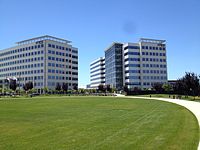Juniper Networks

The New Network Is Here
|
|

Juniper's headquarters in Sunnyvale
|
|
| Public | |
| Traded as | : JNPR S&P 500 Component |
| Industry | Networking equipment |
| Founded | February 6, 1996 |
| Founder | Pradeep Sindhu |
| Headquarters | Sunnyvale California, United States |
|
Key people
|
Scott Kriens (Chairman) Pradeep Sindhu (Vice Chairman & CTO) Rami Rahim (CEO) |
| Products | Routers, switches, security and software |
| Revenue | US$ 4.85 billion (2015) |
| US$ 912 million (2015) | |
| US$ 633 million (2015) | |
|
Number of employees
|
9,058 (2015) |
| Website | www |
Juniper Networks is an American multinational corporation headquartered in Sunnyvale, California that develops and markets networking products. Its products include routers, switches, network management software, network security products and software-defined networking technology.
The company was founded in 1996 by Pradeep Sindhu. It received several rounds of funding from venture capitalists and telecommunications companies before going public in 1999. Juniper grew to $673 million in annual revenues by 2000. By 2001 it had a 37% share of the core routers market, challenging Cisco's once-dominant market-share. It grew to $4 billion in revenues by 2004 and $4.63 billion in 2014. Juniper appointed Kevin Johnson as CEO in 2008, Shaygan Kheradpir in 2013 and Rami Rahim in 2014.
Juniper Networks originally focused on core routers, which are used by internet service providers (ISPs) to perform IP address lookups and direct internet traffic. Through the acquisition of Unisphere in 2002, the company entered the market for edge routers, which are used by ISPs to route internet traffic to individual consumers. Juniper Networks entered the IT security market with its own JProtect security toolkit in 2003 before acquiring security company NetScreen Technologies the following year. It entered the enterprise segment in the early 2000s, which accounted for one-third of revenues by 2005. As of 2014, Juniper has been focused on developing new software-defined networking products. However, in 2016, the company encountered some controversy under suspicion allegedly putting backdoors into its ScreenOS products.
...
Wikipedia
